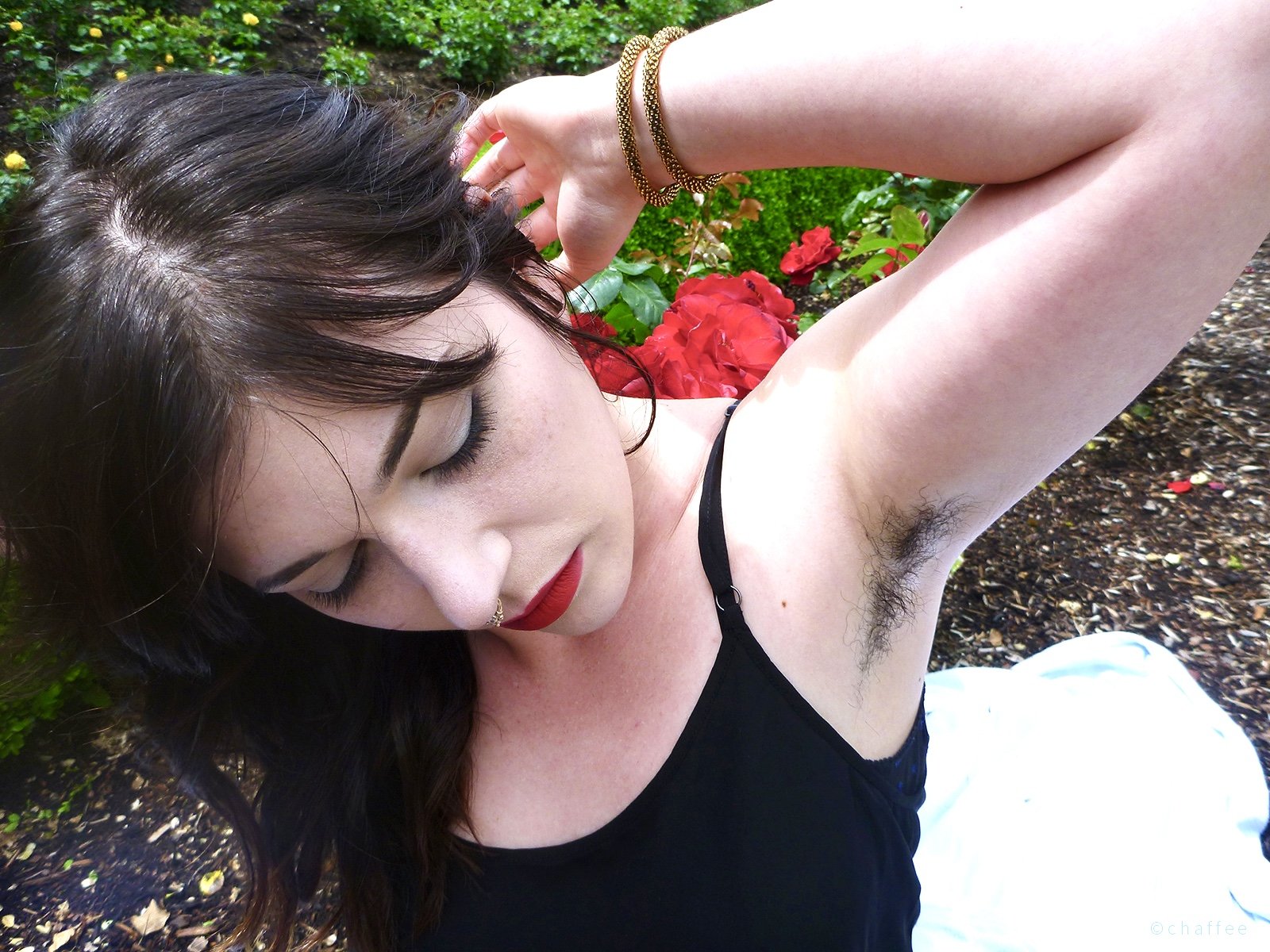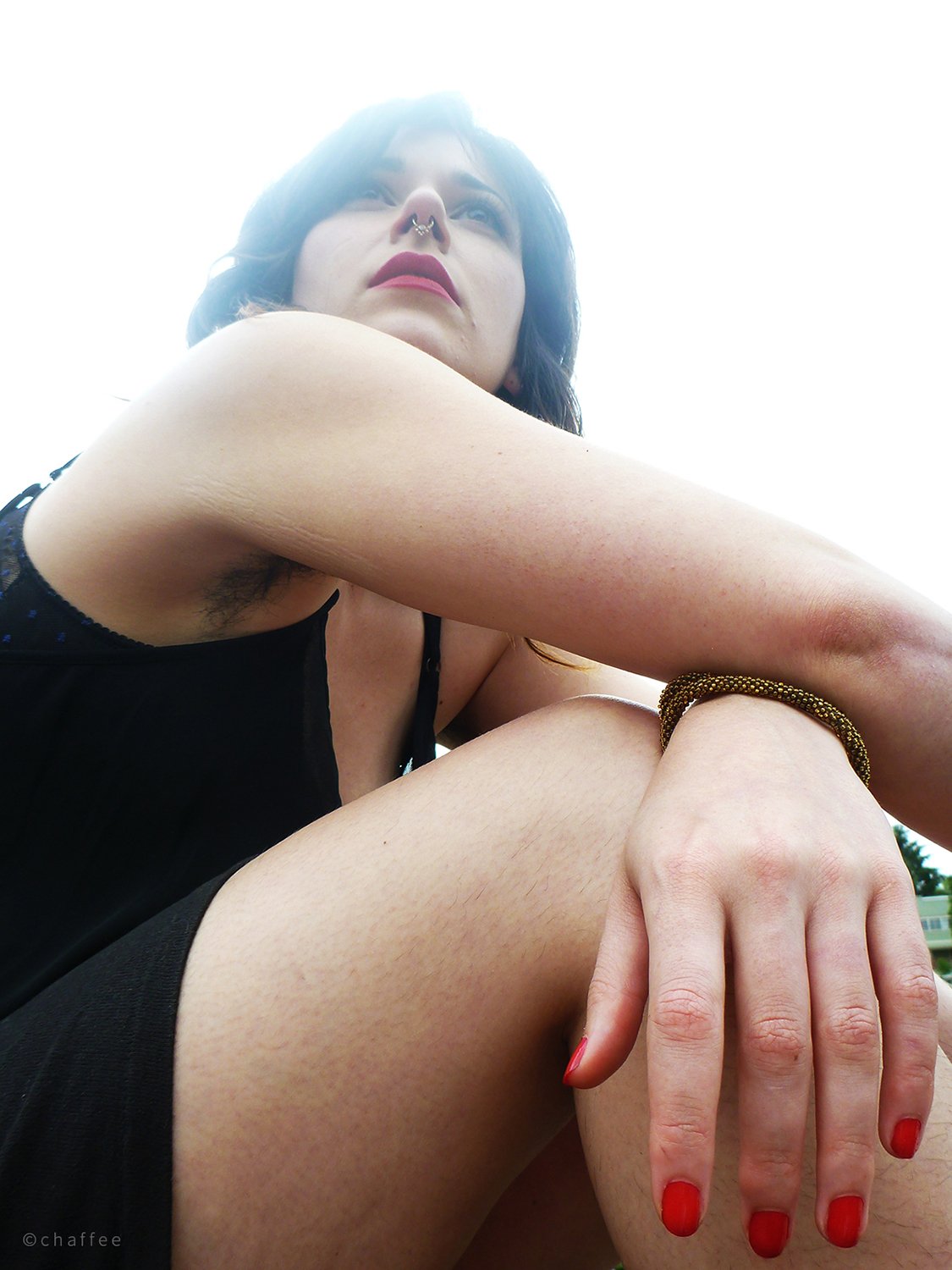hair: androgenic & vellus
“the reason i decided to do hair as the subject of this process is it is one of the things i’ve struggled with the most, appearance-wise, as a woman, aside from my weight. i think the things that really affected me growing up in terms of body hair weren’t so much parental pressure (because my parents were always very careful when i was a teenager to encourage my creativity) but social pressure. i got made fun of by guys, especially when i was in puberty, for body hair or being mannish because of it. i was called a gorilla, and a whole long list of other things that are maybe too gross to repeat.
i used to shave my armpits twice every day! once before school, once after. i'd give myself razor burn and sometimes would bleed! one of the reasons i don’t shave anymore is because i have sensitive skin and it hurts my armpits. if i wax i break out in terrible breakouts and ingrown hairs and its really painful. why would i do that to myself? i feel like a joyous and fulfilled person is going to be more beautiful and more interesting than a person who’s unhappy because they are spending so much time and effort and money and whatever trying to fit into this cultural norm.
there are things about my body that shouldn’t be inherently gendered but my whole life they have been. we don’t even realize that we’re worried about being socially judged and we tend to modify our behaviors pretty regularly for social approval or disapproval that we aren’t even necessarily thinking about. the idea of hair being a masculine thing is so ridiculous to me especially when you consider that that’s the gender that is more likely to have alopecia and lose all the hair on their head. what is the point of applying gender ideas to this? that’s like saying “you know what? eyes are masculine. your teeth are so mannish.” that’s absurd! i don’t even know where it came from originally – who was the first woman to be like “i’m going to shave my armpits today - that’s a great idea!” and then it caught on. where did it come from? i think it does have a lot to do with pre-pubescence. there’s also the fact that usually testosterone levels affect how hairy you are. maybe women who were very feminine originally had slightly less body hair –maybe it caught on and now here we are shaving all the hair off of our bodies. at some point it just becomes this accepted social norm.
gender thinking has progressed a lot. we started out at the beginning of the last century with a dichotomy - there is man and there is woman. and then that started to shift and we came up with the idea of a scale. the kinsey scale was an identifier of if you’re straight or gay. its like a scale of 1 to 10 and most people fall on a scale rather than being a 1 or a 10. so then for a long time in gender studies we have this
idea of a scale and most people are more on a scale of feminine or masculine. and i think we should probably be ready to move past even the idea of a scale. i still feel like the scale is assigning a dichotomy and is as limiting as the dichotomy used to be limiting. when you think about people – not as a man or a woman or feminine or masculine – but people as just people – you have all of these traits everybody can have.
i think a lot of the problem is labeling. when you have a man who is very assertive and you have a woman who is very assertive – the man is a ‘go-getter’ and the woman is ‘bossy.’ or when you have a woman who is a care-taker and a man who’s a caretaker – the woman is a caretaker and the man is effeminate or a pansy. these are traits that we’ve always seen in people. they’ve always been inherent in people. we wouldn’t have the words like pansy or bossy if they hadn’t always been around. its just that we’ve always tried to assign them to a dichotomy – and punish people who don’t fall ‘correctly’ on the dichotomy. its not like its anything new, but i think that we need to change the language for how we describe traits in people. instead of somebody being a bitch she too could just be an asshole or maybe you’re calling her a bitch because she is in a position of power and trying to be a boss.
maybe you could just say ‘oh she’s kind of a controlling manager.’ i think it’s really complex as issues of gender nonconformity become more mainstream, and it gets more and more complex as we realize that there are as many ways to present gender as there are humans. historically, at it’s simplest form, this dichotomy all came from ideas of ownership and control. we had to have control of women, because in a patriarchal society, we had to have control over the male genetic line for reasons of inheritance of property. but when you make somebody property, you really effectively make them an ‘other.’ and suddenly the differences between men and women becomes really important, and even little differences become huge because when somebody is an ‘other’ we feel justified making them lesser, and by making them lesser, we feel justified making them property.
if we didn’t other them, then who’s to say that we can’t be property, too? the system would fall apart. so they become other. and now, when we’ve made so much progress in other areas, we’re still fighting these boxes that we’ve put people into for so long. and it goes both ways - it doesn’t just hurt women, it hurts everybody to have to feel shame for not fitting perfectly into boxes. men experience it too, when they feel that they don’t measure up to a masculine image. the dichotomy is very damaging, and it makes more sense why it’s damaging when you understand that it originates from a place of perpetuating control and ownership. that being said, i feel like being able to exercise this ability to embrace my natural body hair comes from a place of privilege. i am a cis woman, i am a feminine presenting woman, and i have the privilege of being a pretty attractive person - which is kind of uncomfortable to talk about but i’m going to talk about it anyway because i think it needs to be said to understand why i can get away with deviation. the ways in which i am able to express this self is because i am accepted by society in ways that
other people are not. when i have armpit hair and leg hair, it might be unnerving to some, but i get a pass because the rest of me conforms. maybe the biggest shame when i think about that is the shame that i have this ease to my life. for a long time i didn’t really see that about myself and i always thought that i was actually a really ugly person, and i remember the claustrophic feeling of living in a society that doesn’t value me.
but now, as an adult, i know i don’t run into the problems that other people experience - especially queer women of color – who run into all of these very real daily problems that i don’t face. not that i don’t face other problems when it comes to harassment, sexual harassment, or the violent male gaze. but, i think the biggest thing is – leading this life of privilege but also being in the position to talk to so many people through my work (i’m a hairdresser, so i deal really personally with people’s issues of self worth and image) – something that i try really hard to do is to be a voice of solidarity.
more than anything else i want people to know that somebody that they maybe look at as confident or in a place of authority as part of the beauty industry sympathizes with them, sees them as attractive, and thinks that they should be able to do whatever they want to do, and to look and express themselves however they want to. i want them to know that there’s not just one way to do that. i try to create, for my clients and my friends, a sense of community. i think that the best thing that we can do to combat these unrealistic expectations is to create a sense of accepting community, to practice radical acceptance for every person, every body.”
our wholeness: an empathy and photography series honoring our diverse truths, tenderness, power.
hair: androgenic and vellus
copyrighted material. for usage rights contact forest chaffee www.empathystories.org
© chaffee 2015










